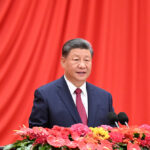In accordance with relevant laws and regulations, China’s Ministry of Commerce said Tuesday that it will probe into PVH Corp. of the US under the unreliable entity list framework for suspected discriminatory measures and other practices violating market trading principles regarding Xinjiang-related products. This news was widely reported in foreign media and seemed to take many by surprise. It was also interpreted by some media outlets as a “tough signal” from China regarding Xinjiang-related issues. Objectively speaking, in response to PVH’s boycott of cotton products from China’s Xinjiang Uygur Autonomous Region and other related products without justification, China’s initiation of this investigation is completely reasonable and legitimate. It represents a justifiable move by the Chinese government to safeguard the legitimate rights and interests of relevant enterprises and industries.
Multinational companies are welcome to invest in China; however, this does not mean that China will compromise on issues concerning principles and positions. In the face of actions that obviously have non-commercial purposes, and discriminatory measures against China – particularly concerning Xinjiang-related products – China will, of course, use legal methods to safeguard the legitimate rights and interests of relevant Chinese enterprises and industries, and to defend a fair and just international trade order. There is no need for surprise.

In recent years, absurd anti-China narratives, such as “genocide” and “forced labor” in Xinjiang, have seriously disrupted the order of global textile and garment industry. Many well-known global apparel companies have been compelled to make the so-called “politically correct” choice regarding the issue of Xinjiang cotton. PVH owns apparel brands such as Calvin Klein and Tommy Hilfiger. According to the Wall Street Journal, PVH states that China is an “important growth engine” for the company, with revenues increasing by more than 20 percent last year, and that it also wants to focus on increasing brand awareness in China. However, according to CNBC, in a corporate responsibility report released in 2022, PVH said that Xinjiang is one of the regions where no direct or indirect sourcing is permitted. PVH ostensibly emphasizes the “importance” of the Chinese market, but what it is actually doing is cooperating with the US government’s discriminatory suppression of Xinjiang-related products, which has seriously undermined the legitimate rights and interests of Chinese enterprises as well as jeopardized China’s sovereignty, security and development interests. PVH must provide a clear and unequivocal explanation.
The Chinese side will not allow entities that slander and defame China to act with impunity in China, nor will it tolerate actions aimed at “using the Xinjiang issue to contain China.” Over the past two years, pressuring multinational companies to withdraw from Xinjiang has been a common tactic employed by certain anti-China forces to discredit the nation and promote “decoupling” from China. There are many examples of this. For instance, last year, Volkswagen stated that an audit of its jointly owned site in Xinjiang had found no signs of forced labor; but recently, it was subjected to a presumption of guilt by certain foreign media which claimed that the audit failed to meet key aspects of the international standard. Similarly, German chemical giant BASF reported that its audits found no evidence of human rights violations at its joint ventures in Xinjiang, yet it was forced to accept “allegations inconsistent with corporate values” and divest from those joint ventures. We hope that multinational companies looking to expand their business in Xinjiang can trust the facts they observe and avoid becoming victims of political manipulation.
China’s implementation of the unreliable entity list is both legitimate and necessary. The first article of the “Provisions on the Unreliable Entity List” clearly states that the provisions are formulated “for the purpose of safeguarding national sovereignty, security and development interests, maintaining fair and free international economic and trade order, protecting the legitimate rights and interests of enterprises, other organizations, and individuals of China.” We cannot allow relevant companies or entities to openly violate Chinese laws and follow certain countries in practicing long-arm jurisdiction. China must take strong countermeasures against such behavior, sending a clear signal: Any company wishing to engage in trade with China must comply with Chinese laws and regulations.
It is important to clarify that China’s attitude toward the issue of unreliable entity list is cautious, and foreign entities that adhere to integrity and the law will continue to be welcomed. Multinational companies conducting business in China should respect the facts, recognize right from wrong, and value the opportunities for investment and development in Xinjiang. China does not intend to “punish” the relevant companies; the 30-day window given to PVH to cooperate with the investigation and provide relevant documents is meant to encourage PVH not to stubbornly position itself as a victim of US trade protectionism. While China welcomes multinational companies to invest and operate within its borders and values normal trade relations with the US, this does not mean that China will leave room for compromise on issues concerning principles and positions.
GT



